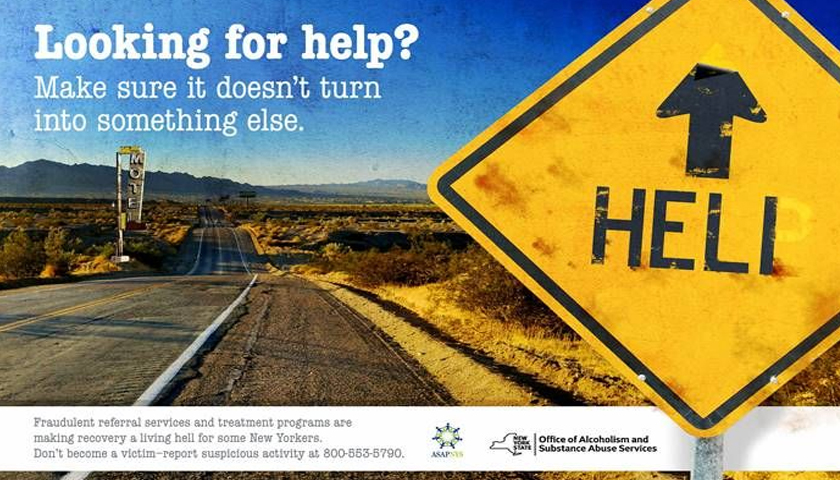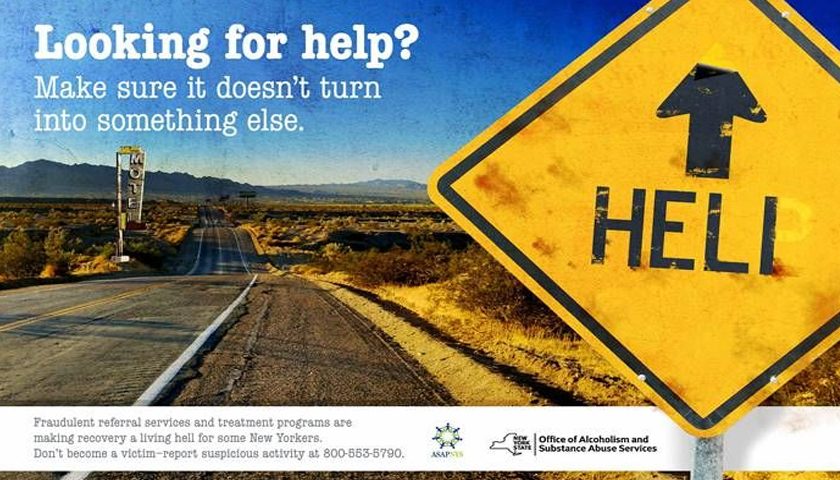The opioid epidemic, which was officially declared a public health emergency in 2017, has impacted the lives of millions of Americans and created a booming market of addicts in America.illegal practices, such as patient brokering prey on vulnerable treatment-seeking individuals, targeting thosewith private insuranceand referring them to often inadequate facilities.
The Stop Treatment Fraud poster series, created by Eric Mower + Associates, depicts how individuals are promised resort-like conditions and successful treatment programs, but often find themselves in recentlyclosed motels turned into “treatment facilities”designed to drain their insurance benefits. The posters warn individuals to be aware of suspicious activity before signing upand to report suspected patient brokers and their activities.Syracuse Behavioral Healthcare drove the development of the poster campaign, which is running statewide in New York. The posters are available for download here and will also be emailed out to treatment providers across the state.
“Patient brokering targets vulnerable members of our community, impeding their recovery with inadequate and ineffective treatment at and exorbitant cost,” said Jeremy Klemanski, president and CEO, Syracuse Behavioral Healthcare. “The Stop Treatment Fraud posters capture the hopelessness and despair many experience after falling victim to this illegal practice. We hope raising awareness of this illegal practice helps put an end to it.”
The program features three posters which call upon treatment seekers, their families and the individuals assisting them to report any suspicious activity. These will be displayed in locations such as healthcare providers’ offices, treatment and recovery centers, as well as public spaces like hospitals, emergency rooms, community centers, libraries and criminal justice centers.
“The EMA team jumped at the chance to create these posters that may ultimately save lives by protecting individuals seeking treatment for addictions,” said Maggie Hooper senior account supervisor andleader of EMA’s healthcare specialty.
New Yorkers struggling with an addiction, or whose loved ones are struggling, can find help and hope by calling the state’s toll-free, 24-hour, 7-day-a-week HOPEline at 1-877-8-HOPENY (1-877-846-7369) or by texting HOPENY (Short Code 467369).
Available addiction treatment including crisis/detox, inpatient, community residence, or outpatient care can be found using the NYS OASAS Treatment Availability Dashboard at FindAddictionTreatment.ny.gov or through the NYS OASAS website. Visit CombatAddiction.ny.gov to learn more about the warning signs of addiction, review information on how to get help, and access resources on how to facilitate conversations with loved ones and communities about addiction. For tools to use in talking to a young person about preventing alcohol or drug use, visit the State’s Talk2Prevent website.
Links
https://www.oasas.ny.gov/treatment/StopTreatmentFraud.cfm
https://findaddictiontreatment.ny.gov/pub/ctrldocs/oasastaw/www/index.html
https://www.oasas.ny.gov/treatment/index.cfm

